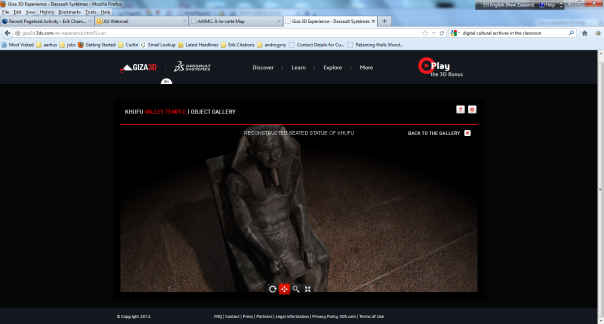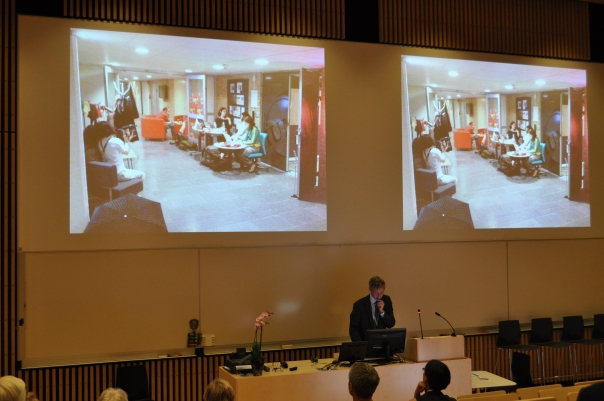VAST2012: The 13th International Symposium on Virtual Reality, Archaeology and Cultural Heritage Brighton, UK, 19-21 November 2012
Use inspired technological advances in heritage
www.vast2012.org
DEADLINE: 23 SEPTEMBER, 2012
Digital technology has the potential to influence every aspect of the cultural heritage environment. Archaeologists and cultural heritage scientists as well as Information and Communication Technology (ICT) experts have in the past collaborated to find solutions to optimise all aspects of capturing, managing, analysing and delivering cultural information, but many unsolved problems remain. The goal of VAST 2012 will be to build on the open dialogue between these different areas of expertise, and in particular allow ICT experts to have a better understanding of the critical requirements that cultural heritage professionals have for managing and delivering cultural information and for the ICT systems that support these activities.
To achieve this VAST 2012 will explore the entire pipeline of ICT in cultural heritage from background research to exploitation. The conference not only focuses on the development of innovative solutions, but it will investigate the issues of the exploitation of computer science research by the cultural heritage community. The transition from research to practical reality can be fraught with difficulty. The digital environment provides new opportunities and new business processes for sustainability, but with these opportunities there are also challenges. VAST 2012 will provide an opportunity for the heritage and ICT communities to understand these challenges and shape the future of ICT and heritage research. We are seeking contributions that advance the state of the art in the information technologies available to support cultural heritage. In particular:
Data Acquisition and Processing:
2/3/4D data capture
Geometry processing and representations
On-site and remotely sensed data collection
Digital capture of intangible heritage (performance, audio, dance, oral)
Geographical information systems
Metadata Handling:
Classification schemas, ontologies and semantic processing
Long-term preservation of digital artefacts
Annotations
Digital libraries, data management and collection management
Multilingual applications, tools and systems
Presentation:
Mobile technologies
Virtual museums
Augmentation of physical collections with digital presentations
Interactive environments and applications
Multi-modal interfaces and rendering
Storytelling and design of heritage communications
Usability, effectiveness and interface design
Intelligent and knowledge-based tools for digital reconstruction
Authoring tools for creating new cultural experiences
Practitioners’ Experience:
Professional and ethical guidelines
Standards and documentation
Requirements and policies
Methodological issues and research paradigms
Tools for education and training
Serious games in cultural heritage
Assistance in monitoring and restoration
Economics and Business:
Economics of cultural informatics
Watermarking, provenance, copyright and IPR
Business models and sustainability for ICT in cultural heritage
Impact of ICT applications in cultural heritage
Other relevant works concerning the application of information technologies to Cultural Heritage, not explicitly included in the above categories, are also welcome for submission. Accepted papers will be presented in the form of:
· Full research papers presenting new innovative results: these papers will be published by Eurographics in the EG Symposium Series (ISSN 1881-864X). The contributions should not exceed 8 pages, including bibliography and illustrations.
· Short papers presenting preliminary results and works-in-progress or focusing on on-going projects, the description of project organization, use of technology, and lesson learned. These papers will have an oral and poster presentation and will be published in the “Projects & Short Papers” proceedings volume. The contributions should not exceed 4 pages, including bibliography and illustrations.
BEST PAPERS AWARD The best papers selected at VAST 2012 will have the opportunity to be submitted to the ACM Journal on Computing and Cultural Heritage (JOCCH). JOCCH is published online during the year and then a hardcopy volume is produced at the end of the year.
All submissions will be reviewed and feedback given to the authors. See detailed information on submissions (http://www.vast2012.org/submissions). To have the paper published in the proceedings, at least one of the authors must register to the Conference after being notified of acceptance but before submitting camera-ready copies.
DEADLINE: 23 SEPTEMBER, 2012




